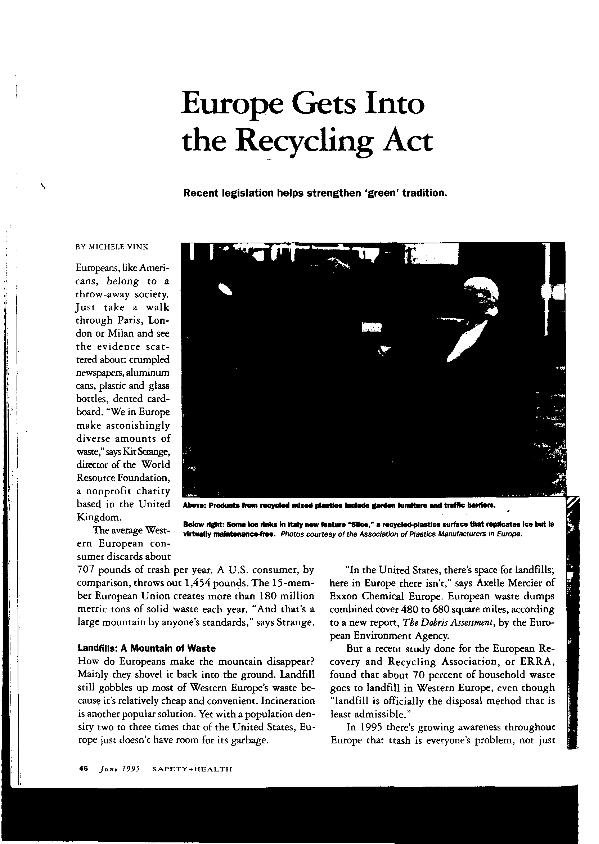Europe gets into the recycling act

Contenido multimedia no disponible por derechos de autor o por acceso restringido. Contacte con la institución para más información.
| Tag | 1 | 2 | Value |
|---|---|---|---|
| LDR | 00000nab a2200000 i 4500 | ||
| 001 | MAP20071023062 | ||
| 003 | MAP | ||
| 005 | 20080418120814.0 | ||
| 007 | hzruuu---uuuu | ||
| 008 | 950721e19950601usa|||| | |00010|eng d | ||
| 040 | $aMAP$bspa | ||
| 084 | $a832.4 | ||
| 100 | 1 | $0MAPA20080087098$aVink, Michele | |
| 245 | 1 | 0 | $aEurope gets into the recycling act$cby Michele Vink |
| 520 | $aToday there are recycling programs throughout the EU, from Turin, Italy, to Dundee, Scotland. Some systems depend on curbside pickup of multicolored trash bags. Others require home owners to haul recyclables to the nearest collection site. Increasingly, industry recycles certain materials, such as plastics, in one "closed loop". The most commonly recycled materials are glass, paper, steel, aluminium and plastics. How do EU countries compare? According to many experts, Germany has the most comprehensive recycling program in the world, with Denmark and the Netherlands not far behind. These three countries aim to recycle waste at rates of 50 percent to 80 percent within the next decade | ||
| 650 | 1 | 1 | $0MAPA20080552374$aReciclaje |
| 650 | 1 | 1 | $0MAPA20080577803$aResiduos sólidos |
| 650 | 1 | 1 | $0MAPA20080548896$aResiduos |
| 650 | 1 | 1 | $0MAPA20080608057$aProgramas de actuación |
| 650 | 1 | 1 | $0MAPA20080612870$aTratamiento de residuos |
| 650 | 1 | 1 | $0MAPA20080540975$aEuropa |
| 650 | 1 | 1 | $0MAPA20080568863$aEstados Unidos |
| 740 | 0 | $aSafety & health | |
| 773 | 0 | $tSafety & health$dItasca$gVol. 151, nº 6, June 1995 ; p. 46-50 |

